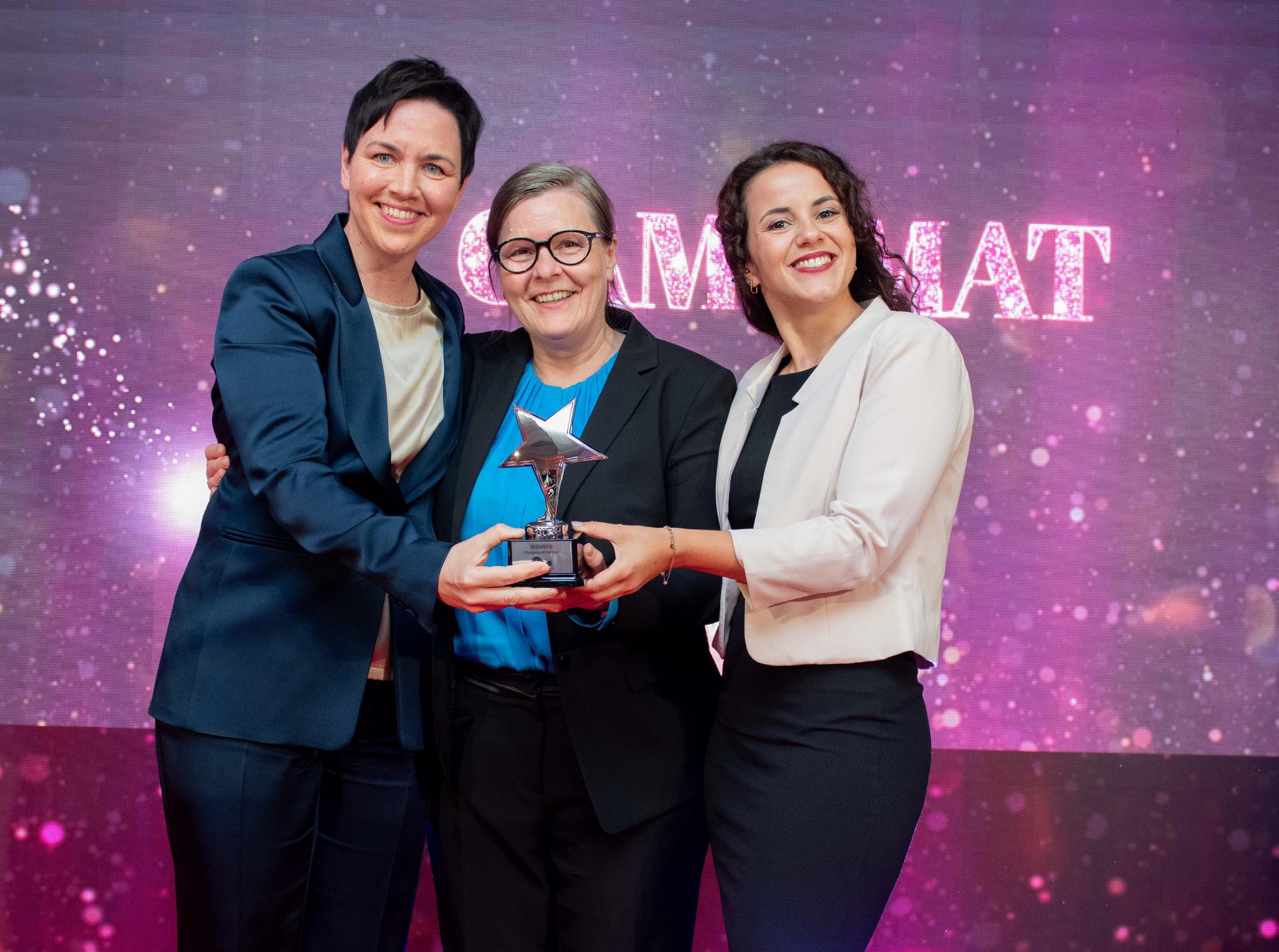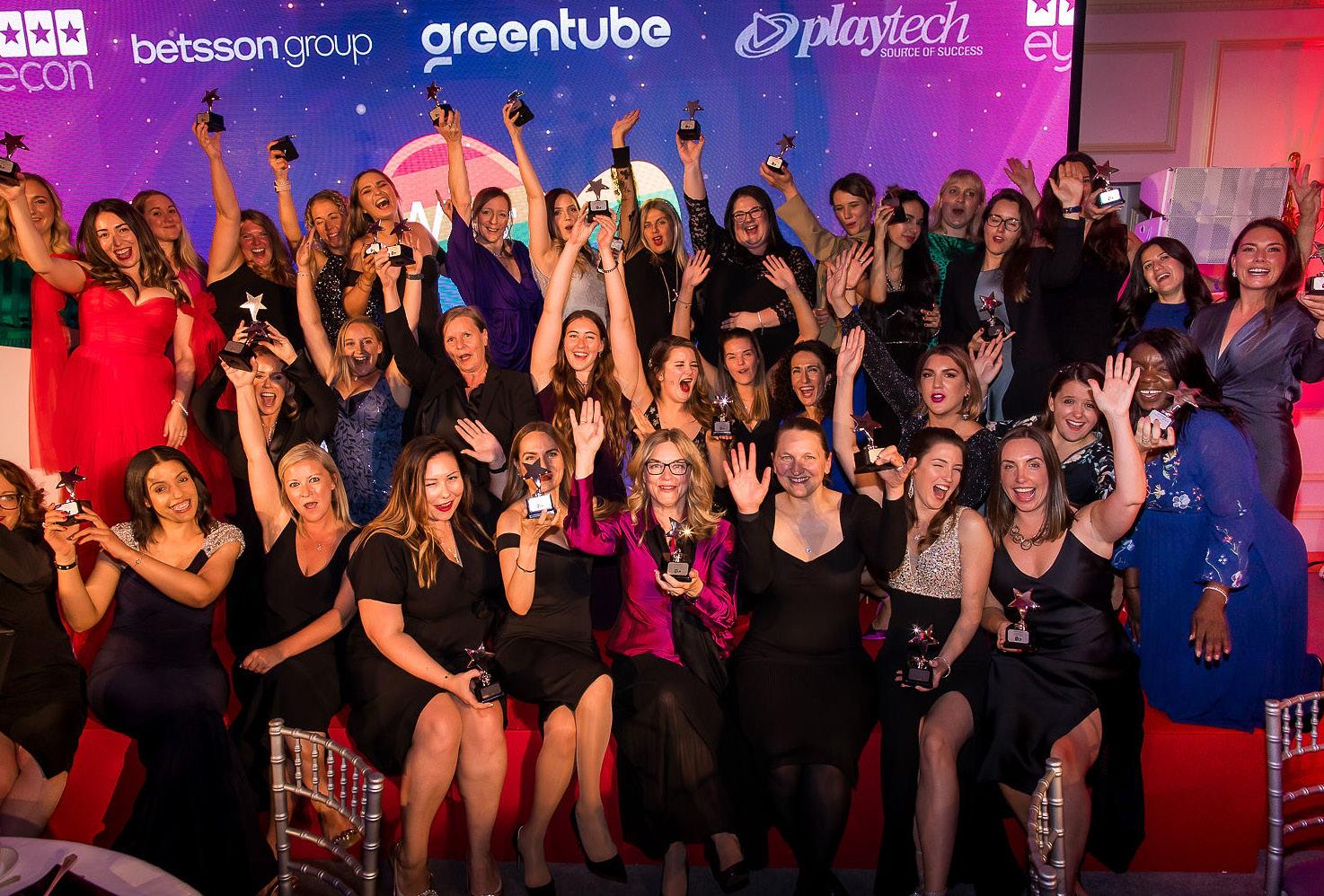








Editor
you to the latest edition of Infinity Gaming Magazine.










Editor
you to the latest edition of Infinity Gaming Magazine.

Lana Thompson - Editor
Welcome to the latest edition of the Infinity Gaming Magazine and firstly Congratulations to all those inspiring individuals and companies at the 2024 Women in Gaming Diversity Awards (WIGD), the atmosphere was electric and everyone of you supported each winner, whether it be for your company or another, you truly all are brilliant.
The 6th June at the beautiful Savoy Hotel saw so many inspiring individuals and companies being rewarded for excelling in celebrating diversity and inclusion within the workplace, and at the very start we had the superb Tracey G. Wiley who flew from the US specially for the awards to make the keynote speech in front of a hushed audience, thank you so much Tracey for a truly inspiring talk.
The WIGD Awards wants to grow further
next year, even thou we were sold out 6 weeks before, let this innovative original event show the power of the movement, it is all up to us to push it even further, we can if we want.
What is so special about the WIGD Awards is the support from each person either to a single winner or a competing company, each and every winner is applauded by the whole room, you truly are so special.
We want to thank each and every one of our sponsors for believing in what the WIGD does in recognising inclusion and diversity within the gaming sector, so thank you Betsson, Bally’s, Digitain, Light & Wonder, Playtech, Gamomat and IGT for your continuing support.
Inside the magazine of course is all the winner images and those very special moments we captured, also the very latest developments and news from the industry, making this one of the best editions of the magazine for the year.
Enjoy this special edition of the magazine.
CONTACT US
Clever Duck Media Centrix@Keys
Keys Park Road
Staffordshire WS12 2HA UK Tel: +44(0)1543 478 889
PRODUCTION
Clever Duck Media Centrix@Keys
Keys Park Road
Staffordshire WS12 2HA UK
PUBLISHING
Infinity Gaming Magazine is operated by © Clever Duck Media Ltd ® Company Reg. No. 687 1018 (Registered in England) V.A.T reg. no 972 6372 91
Sponsorship Opportunities Colin@cleverduckmedia.com
Business Partnerships Svetlana@gaming-awards.com
Marketing & Advertising claire@cleverduckmedia.com
Editorial Content & PR media@cleverduckmedia.com
“To Infinity and Beyond!”
Regards, Lana
The Editor











With the Conservative Party trailing significantly in the polls, the prospect of a Labour victory has raised questions about the future direction of gambling regulation in the UK. As the industry awaits the outcome, stakeholders are closely monitoring the policy platforms of the major political parties and the potential implications for the sector.
The decision by Prime Minister Rishi Sunak to call a snap general election, several months ahead of the expected timeline, has been met with a mix of surprise and speculation. Many political analysts attribute this move to the Conservatives’ faltering popularity in the face of a resurgent Labour Party, which has maintained a substantial lead in the polls.
In contrast, the Labour Party has signalled a more aggressive approach to gambling reform. Carolyn Harris, the chair of a cross-party group examining gambling-related harm, has ad -
vocated for a £2 maximum stake limit for all online slot games, regardless of the player’s age. This stance suggests that a Labour victory could lead to even tighter regulations than those proposed by the Conservatives.
The perceived weakness of the UK Gambling Commission has also been a point of contention, with some Labour figures, such as Councillor Lucia das Neves, calling for legislative changes that would grant local councils more authority in overseeing the gambling industry. This shift could result in a more decentralized and potentially stricter regulatory environment, should Labour form the next government.
If the Conservatives remain in power, the measures outlined in the recent White Paper on gambling reform are likely to be implemented, albeit with the potential for some modifications. Conversely, a Labour victory could pave the way for more stringent regulations, including stricter affordability
checks, a ban on sports sponsorships by betting companies, and a potential reconsideration of the proposed maximum stake limits.
The issue of gambling sponsorships, particularly in the realm of sports, has also come under scrutiny. The Liberal Democrats have voiced their support for a ban on such arrangements, a position that could gain traction if Labour emerges victorious. This potential shift could have far-reaching consequences for the financial relationships between the gambling industry and various sports leagues and teams.
Given the Labour Party’s stated positions on gambling reform, a victory for the party could result in the implementation of more stringent regulations than those proposed by the Conservatives. This could include lower maximum stake limits, stricter affordability checks, and potentially even a ban on gambling sponsorships in sports.




As the highly anticipated Euro 2024 football tournament in Germany draws near, the authorities in Singapore are ramping up their efforts to combat illegal and problem gambling activities. With the quadrennial European Championship set to kick off on June 14th and run until July 14th, the Ministry of Home Affairs (MHA) and the Ministry of Social and Family Development (MSF) have issued a stern warning, vowing to take tough enforcement action against any unlawful gambling operations.
Illegal gambling, as the authorities have emphasized, does not come with the necessary social safeguards that licensed and regulated gambling platforms provide, such as expenditure limits and responsible gambling measures. This poses a significant risk, as gamblers who engage with unscrupulous operators may find themselves vulnerable to financial ruin and the detrimental effects of problem gambling.
The joint press release from MHA and MSF reiterates that Singapore Pools is the only entity legally authorized to offer lotteries and sports betting services in the country. Any gambling activities that are not licensed or specifically exempted are strictly prohibited within Singapore’s borders.
The authorities have pledged to take robust enforcement action against illegal gambling, targeting not only the individuals directly involved but also those who assist gambling syndicates. In 2023 alone, the police conducted over 300 raids on illegal gambling operations, resulting in the arrest of more than 450 individuals.
The Gambling Regulatory Authority has taken proactive measures to disrupt the infrastructure supporting illegal remote gambling services. They have blocked over 3,400 unlawful gambling websites, closed more than 260 bank accounts, and seized in
excess of S$36 million (US$27 million) in payments linked to these illicit activities.
During the previous European Football Championship in 2021, Singapore authorities participated in an Interpolled operation targeting illegal football gambling. The joint effort led to the arrest of 72 individuals and the seizure of more than S$800,000 (US$591,423) in cash, along with computers, laptops, mobile phones, and other items.
To complement the enforcement efforts, the authorities are also strengthening public education and outreach initiatives during the Euro 2024 tournament. The National Council on Problem Gambling (NCPG) and the National Crime Prevention Council (NCPC) will be spearheading advertising campaigns across various media platforms, including television, newspapers, outdoor screens, and digital/ social media.
As cyber threats continue to escalate in sophistication and frequency, businesses are facing an unprecedented challenge to protect their sensitive data and critical infrastructure. A powerful ally has emerged in the form of ethical hackers
The term “ethical hacker” often conjures up images of a mysterious figure in a black hoodie, skillfully navigating the digital underworld. However, the reality is far more nuanced. Ethical hackers are highly trained security experts who understand the latest social engineering tactics and possess a deep understanding of hacking methodologies, often drawing from their past experiences with black hat hacking. This unique perspective makes them invaluable assets in the fight against cyber threats.
Recent developments in the legal landscape have further bolstered the role of ethical hackers. The Department of Justice’s revision of the Computer Fraud and Abuse Act (CFAA)
has provided a significant milestone for the ethical hacking community. This revision ensures that software testing, security flaw analysis, and other “ethical hacking” activities will no longer be subject to prosecution, empowering these professionals to showcase their skills and contribute to the security of businesses without fear of legal repercussions.
At the core of ethical hacking lies the process of penetration testing, also known as pentesting. This comprehensive security assessment allows ethical hackers to thoroughly examine an organization’s systems, identifying vulnerabilities and potential entry points for malicious actors. By employing the same tools and techniques used by cybercriminals, ethical hackers
can provide invaluable insights into an organization’s security posture, enabling them to implement targeted prevention strategies.
While traditional penetration testing has long been a staple in the cybersecurity landscape, the advent of Pentest as a Service (PtaaS) has introduced a more dynamic and efficient approach. PtaaS platforms provide organizations with on-demand access to a pool of ethical hackers, who can conduct ongoing security assessments and deliver real-time insights. This agile approach allows for quicker identification and remediation of vulnerabilities, keeping businesses one step ahead of evolving cyber threats.

The benefits of PtaaS are multifaceted. By leveraging the expertise of ethical hackers, organizations can gain a comprehensive understanding of their security vulnerabilities, enabling them to address these issues proactively. PtaaS platforms also offer increased efficiency, as they eliminate the lengthy timelines and static reports associated with traditional penetration testing. This allows IT teams to work more productively, focusing their efforts on resolving security gaps rather than waiting for lengthy test results.
Ethical hackers are the driving force behind the success of PtaaS. These professionals possess a unique blend of creative intent, motivation, and deep
understanding of security practicesattributes that cannot be replicated by software or automation alone. By leveraging their expertise, organizations can gain a comprehensive understanding of their security vulnerabilities and implement targeted prevention strategies.
The cybersecurity industry is facing a significant talent shortage, with the U.S. Bureau of Labor Statistics projecting a 35% growth in information security analyst roles over the next decade. Ethical hacking presents a promising career path that many job seekers may be unaware of, offering a solution to this pressing challenge. By opening the talent pool and providing hands-on learning opportunities, such as appren-
ticeship programs, organizations can attract a diverse pool of candidates and equip themselves with the skills and insights needed to combat evolving cyber threats.
As organizations continue to scale and undergo digital transformation, the risk of exposing sensitive data is higher than ever. Businesses of all sizes and industries must evolve their security measures to protect their valuable information and maintain a competitive edge. Ethical hackers play a crucial role in this endeavor, as they possess the unique understanding of attack operations and can preempt the strategies of malicious actors.


















In the digital age, a business’s reputation and customer trust are inextricably linked to its cybersecurity posture. Failing to prioritize security can have devastating consequences, from data breaches to reputational damage. By leveraging the expertise of ethical hackers, organizations can demonstrate their commitment to safeguarding their customers’ data and maintain the trust that is essential for long-term success.
Ethical hackers employ a wide range of tools and techniques to assess an organization’s security vulnerabilities. These include session hijacking, SQL injection, and footprinting - all of which
are used to identify weaknesses and potential entry points. By understanding the mindset and methods of malicious actors, ethical hackers can develop effective countermeasures and implement robust security strategies.
Effective cybersecurity is not a solo endeavor; it requires a collaborative approach involving various stakeholders. Ethical hackers work closely with IT teams, security professionals, and business leaders to ensure that vulnerabilities are identified, remediated, and that comprehensive security measures are implemented. This holistic approach enables organizations to stay ahead of
the ever-evolving threat landscape.
In the face of escalating cyber threats, organizations must embrace innovative security solutions that leverage the expertise of ethical hackers. By partnering with PtaaS providers and integrating ethical hacking into their comprehensive security programs, businesses can fortify their defenses, protect their valuable assets, and maintain the trust of their customers. As the cybersecurity landscape continues to evolve, the role of ethical hackers will only become more crucial in safeguarding the digital future.




Some 45+ companies attended the 2024 WIG Diversity Awards, making it the largest gathering so far to celebrate the achievements within the sector.

A TIME TO MEET OLD AND NEW FRIENDS AND OF COURSE TO NETWORK WITH COMPANIES STRIVING TO ACHIEVE DIVERSITY & INCLUSION




FINALISTS, THEIR COMPANIES AND COLLEAGUES RELAX BEFORE AND THEN AFTER THE AWARDS CEREMONY









ON 26TH OF JUNE

Tracey G. Wiley

When you have such an inspirational speaker at the WIG Diversity Awards all the audience listens, Welcome Tracey G. Wiley.
Tracey is the Executive Dorector of Diversity, Equality & Diversity at Operator Bally’s and has a wealth of experience in diversity and inclusion prior to joining Bally’s in early 2022. Tracey flew over from the US specially to support her colleagues at Bally’s and indeed the whole industry in this original and innovative event.
In her talk Tracey likened her favourite movie of all time, The Wizard of Oz to combatting diversity & inclusion issues within your life, it is really inside you how to battle prejudice and the tools to fight it just like the characters in the movie.
The entire capacity room listened in silence as Tracey made her talk and learned valuable lessons while being entertained by Tracey’s speech


Above Winner Katrina Wigby (Entain) Apprentice of the Year
Below Betsson Group - Best Diverse Place To Work Award




Above Company of the Year – (Supplier) went to












Above Winner Innovator Entain Group


Above Inspiration of the Year – Supplier





Above Marketing Campaign of the Year Anaxi (#IAMANAXI Campaign)
Right Winner Positive Role Model of the Year – (Operator) Serina Donkin (Rank Group)
Above Left Leader of the Year (Suppliers) Sue Dawson (Light & Wonder)
Far Left Positive Role Model of the Year –(Supplier) Marija Hammon (Relax Gaming)
Left Star of the Future (Supplier) Valentina Doca (Arrise powering Pragmatic Play)






SOME GREAT PHOTOS AT THE AWARDS CEREMONY AND CELEBRATING AFTER








Cellene Hoogenkamp - CEO & Founder Kokua Hub & Minke Hendriks-Fransen, Therapist for Women in Transition
What do you need, to be Seen, Respected, and have Impact as Your Authentic Self?

When we at KokuaHub were asked, “Our company has an incredible pool of female talent; how can we develop them into female leaders?” we took the question seriously. To address this, we conducted a survey with senior women from various industries. They identified key areas where they seek the most support: •navigating career growth and transitions, •building their personal brand, •growing and learning within a community of women, •future-proofing their careers, •achieving better work-life balance, and •overcoming hurdles and adversity.
B eing a woman in a male-dominated world of work is challenging. Despite significant progress since women gained suffrage, obstacles and challenges remain in the corporate sphere. How can we overcome these barriers and create a better future for female leaders and entrepreneurs? The solution is more accessible than you might think.
I magine a work environment where
coworkers trust and depend on each other, working together towards common goals and bringing out the best in each other. Sounds like an ideal workplace, doesn’t it?
I f this vision resonates with you, chances are you are a woman. Why? Women excel in soft skills and are naturally inclined to harmonize the collective. They possess strong social and emotional awareness, capable of recognizing a wide range of facial expressions—far more than the basic six (joy, sadness, fear, anger, surprise, and horror) typically identified by men. While there are always exceptions, this has been a general trend throughout history.
H ow It All Started
M en and women differ from each other. Our identities are largely determined by our hormones. Traditionally, men were built to hunt animals in the dangerous outside world to bring food back home. Their skills were tailored for that role. Women, on the other hand, did not have to hunt but had an equally important
role in survival. Their primary tasks included caring for children, staying alert to signs of danger in the immediate environment, and sensing small changes in the behavior and appearance of children and adults (from *Why Men Don’t Listen and Women Can’t Read Maps*, Allan and Barbara Pease, 1998). The roles were clear.
G radually, these role assignments have become blurred. The roles of hunters and caretakers are no longer “gender dependent.” Nevertheless, despite all developments throughout the millennia, we are not so different from our distant ancestors, both biologically and mentally. Men and women are still built differently. According to Allan and Barbara Pease, we are all the result of our chemical makeup—it is in our DNA. Men might still struggle to find feta cheese in the fridge, but if you ask them to drive to a city in the north, they will take you there without hesitation. Women, even those at the top, are still inclined to focus on the collective, the atmosphere in the immediate environment, and maintaining good interconnections.

Let it be clear: This is not a judgment about being male or female. One isn’t better than the other. It’s not a competition. It is a positive development to have more women in the corporate world. We need more women in the corporate world, but that doesn’t mean we don’t need men. We do! We need men and their masculine energy. The right mix benefits a company as long as we learn to understand and respect each other’s differences.
Before we can understand one another, we must understand ourselves better. To know thyself is the beginning of true wisdom. This works both ways: men need to give more space, and women need to take that space. Women must feel that they have every right to exist in these environments. If they do, they will become more visible. My wise
grandma always used to say: “You need to lie down first before they can walk over you.” So stand up and stay standing!
What does this look like in real life? Nine out of ten times when a female trainee or client requests help, there is an underlying part at play: How do I take my place and maintain my individuality (read: femininity)? How do I serve the collective without completely ignoring myself? How do I express my needs and make myself heard? These are enormous challenges for women trying to make themselves understood by male (and female) colleagues.
If you are assertive, you are often seen as a “bitch” with a sharp tongue. If you are accommodating, you are a pushover without prevalence. As a female manager, it seems you can
never get it right.
You need to speak the right language to be heard and understood. But if you just say the words without feeling them, they are mere shallow words. You can talk the talk, but can you walk the talk, preferably in shoes of your liking? Probably not. Yet.
Women have their strengths, just as men do. One of women’s strengths is their keen ability to spot weaknesses—a skill that dates back to ancient hunter-gatherer times. They can discern if someone is all talk and no action. Lowering your voice to fit in with the guys might seem like a good strategy, but it often backfires, revealing insecurity. You can be assertive, but if you don’t believe in what you’re saying, it’s pointless. It might sound right, but it won’t feel right. Right?


To hold your ground in a maledominated world, it’s beneficial for a woman to adopt certain skills typically associated with men. Embrace being a woman but use male energy to your advantage. Be assertive, set boundaries, be clear about what you want and don’t want, and pursue your goals with steadfastness. And most importantly, mean what you say.
You might be thinking: Doesn’t the world need more feminine energy? Absolutely! But as mentioned earlier, it is not a competition. We need to create a balance. Men could benefit from being more tolerant and empathetic towards women at work, listening more to their insights, and recognizing them as valuable assets. However, this cannot be achieved alone. Women need to believe in their right to exist and thrive. They should adopt some male qualities because embracing this energy is key to unleashing their highest feminine potential at work.
The best way to be seen, respected, and recognized is to be authentically you. Embrace the male energy within you as well. Did you know
that despite our DNA differences, we are born assertive? We had to be assertive to ensure our survival as infants, crying to signal our needs. Somehow, along the way, women learned to prioritize the collective over themselves.
KokuaHub understands the importance of women reconnecting with their authentic selves and has developed a platform to support them in achieving this, enabling them to cultivate fulfilling and meaningful careers both professionally and personally.
In this spirit, KokuaHubpresents “The Game - A Transformative Growth Journey for Rising Female Leaders.” More than just a program, it represents a movement towards building a global community of empowered female leaders committed to personal growth and community upliftment. These leaders embody a new paradigm of leadership characterized by authenticity, resilience, impact, and a dedication to collective success. What distinguishes this initiative is our innovative approach to performance coaching, experiential learning, and corporate culture.
By integrating personal growth with professional development, we are redefining success in the corporate world.
Utilizing state-of-the-art technology, evidence-based coaching, and dynamic experiential learning, “The Game” provides thought-provoking experiences that resonate deeply in both group and one-on-one settings. Our flexible, scalable programs transcend geographical boundaries, making profound professional development accessible globally.
Why does this matter? In today’s professional landscape, women face numerous challenges, from burnout and bias to competitive pressures and work-life balance. The traditional approach to career advancement is no longer viable, and for organizations, retaining and advancing top talent is essential. Establishing a culture of coaching, growth, and continuous learning is not just beneficial but necessary to support the holistic well-being of talented leaders.
In this context, “The Game” is more than a program; it represents the future of female leadership—a journey where challenges fuel innovation, where growth arises from adversity, and where participants emerge as visionary leaders poised to inspire and influence.
Join us as we embark on this journey together, shaping a future where female leaders are not only successful but also profoundly impactful and universally respected.
The Game : A tailor made Women in Leadership Program for this industry. To inquire visit website: https://www.kokuahub.com/
The UK gambling market has experienced a resurgence in activity since the initial dip during the COVID-19 pandemic. The advancement of mobile technology has played a pivotal role, making it easier for individuals to engage in gambling activities from the comfort of their own homes. This convenience has led to a significant increase in the number of gamblers, with an estimated 24.7 million people participating in various forms of gambling in 2022, representing a 5% rise from the previous year.
Interestingly, the demographic profile of UK gamblers reveals some interesting insights. While individuals of all ages engage in gambling, the age group with the highest participation is between 45 and 54 years old. Furthermore, men are more likely to gamble than women across all age groups. Contrary to popular belief, those with higher income streams are more inclined to participate in gambling activities.
The shift in consumer preferences has also been notable, with online gambling platforms emerging as the dominant force in the industry. Online gam -
bling, including casino games, bingo, and sports betting, now accounts for half of the industry’s revenue, reflecting the growing popularity of mobile and digital platforms. However, traditional gambling activities, such as casinos and betting shops, still maintain a significant presence and continue to attract a loyal customer base.
The UK gambling industry has demonstrated remarkable resilience and growth in recent years. The online gambling sector, in particular, has experienced a significant surge in revenue. Between April and September 2020, the revenue from online gambling, bingo, and casino games grew by approximately £3.1 billion, representing a 6.3% increase from 2020 to 2021. This upward trend continued, with an 8.0% increase in revenue from 2021 to 2022.
The sports betting segment has also played a crucial role in the industry’s performance. In 2020, UK online bets totaled £5.7 billion, and by 2023, the UK online sports betting market was worth £6.4 billion in gross gaming yield (GGY). Compared to the £6.9 billion in online GGY in 2021, this represents a significant growth trajectory.
Furthermore, the casino gaming sector has contributed significantly to the industry’s revenue. Online casino games, particularly slot machines, have been the most lucrative segment, generating around £3.9 billion in annual GGY, with £3 billion coming from slot games alone. The UKGC has recently introduced additional restrictions for online slots to encourage responsible gambling and mitigate problematic behaviors.
The UK gambling industry has witnessed a substantial shift in consumer preferences, with online and mobile platforms emerging as the dominant channels. In 2022, online gambling accounted for half of the industry’s revenue, reflecting the growing popularity of these convenient and accessible platforms.
The convenience and user-friendly nature of online and mobile gambling have been key drivers of this trend. As the tech-savvy “iGeneration” comes of age, the industry is poised to attract a new wave of customers who are comfortable with and prefer digital gambling experiences.

Interestingly, the popularity of live betting and slots has continued to grow, with live betting GGY increasing by 2% in the last quarter of 2023 compared to the previous year, reaching a total of £565 million. Similarly, the total online bets and spins reached a record of £24 billion, representing a 10% increase.
The UK gambling industry operates within a complex regulatory framework, and the landscape is constantly evolving. Regulatory bodies, such as the UK Gambling Commission (UKGC), have been actively addressing concerns around responsible gambling and problem gambling behaviors.
In recent years, operators and regulators have implemented various strategies to encourage safer gambling practices. These include self-exclusion programs,
deposit limitations, reality checks, a i creased access to support services. The industry has also emphasized the importance of social responsibility, with efforts to address and mitigate the risks associated with problem gambling.
As the industry continues to grow, it is expected that regulatory agencies and operators will place even greater emphasis on responsible gambling, ensuring that the sector maintains a socially responsible and sustainable approach.
The UK gambling industry is constantly adapting to new technologies and emerging trends, shaping the future of the sector. One notable development is the exploration of blockchain technology to create decentralized gambling platforms. This innovation has the potential to introduce more transparency
and security, while also encouraging the adoption of private cryptocurrencies in the industry.
Additionally, the integration of immersive technologies, such as virtual reality (VR) and augmented reality (AR), is transforming the gambling experience. These technologies provide a more engaging and immersive betting environment, blurring the lines between the digital and physical realms.
The rise of live-streamed gambling has also gained traction, as it offers a more authentic and “in-person” experience for gamblers. As these technologies continue to evolve, they are expected to deepen the sense of realism and interactivity within the gambling industry.


Refresh your floor in time for summer with our latest TOP performer Tiger and Dragon™ Multi-Level Progressives!
Incorporating NEW game mechanics, a compelling Bet Up feature and innovative gameplay players will love – get this season’s blockbuster on your floor today.


The gambling industry has also embraced the power of artificial intelligence (AI) and predictive analytics to enhance the customer experience and drive business growth. AI-powered systems are now capable of analyzing player behavior, preferences, and influencing factors, going beyond mere entertainment.
These AI-driven insights allow operators to tailor their offerings, personalize the user experience, and provide more effective support to customers. AI bots are gradually replacing traditional customer service representatives, leveraging their ability to understand and anticipate player needs.
As the industry continues to harness the potential of AI and predictive analytics, it is expected to lead to further advancements in the gambling scene, providing more personalized and datadriven experiences for customers.
The highly competitive nature of the
UK gambling industry has led to a wave of consolidation and mergers among operators. Businesses are aiming to increase their market share and broaden their range of products and services, ultimately enhancing their competitiveness.
Regulatory bodies closely monitor these consolidation efforts to ensure that the industry maintains a level playing field and provides users with genuine choice in where they spend their money. As the industry continues to evolve, it is anticipated that further mergers and acquisitions will shape the competitive landscape, potentially leading to the emergence of larger, more diversified industry players.
Experts predict that the UK gambling industry will continue to experience growth in the coming years, driven primarily by the expansion of online and mobile gambling platforms. As operators continue to evolve and meet the evolving needs of gamblers, more indi-
viduals are expected to engage in various gambling activities.
The increasing popularity of mobile and online betting, combined with the techsavvy “iGeneration” aging into adulthood, is expected to fuel this growth. However, the industry will likely face challenges, including greater regulatory scrutiny, responsible gaming concerns, and competition from emerging markets.
Despite these challenges, the industry’s resilience and adaptability suggest a promising future. Advancements in technologies, such as AI and predictive analytics, are expected to enhance the customer experience and drive further innovation within the sector. Additionally, the industry’s ability to respond to changing consumer preferences and regulatory environments will be crucial in shaping its long-term trajectory.
Over the past decade, the landscape of sports betting in the United States has undergone a significant transformation. The landmark 2018 Supreme Court decision in Murphy v. National Collegiate Athletic Association paved the way for individual states to legalize and regulate sports betting within their borders. This groundbreaking ruling overturned the longstanding federal ban, known as the Professional and Amateur Sports Protection Act (PASPA), and ushered in a new era of sports wagering.
As states have moved to capitalize on the legalization of sports betting, some have emerged as clear leaders in terms of revenue generation. According to the latest data, the states that have generated the most revenue from sports betting include:
New Jersey: As one of the first states to legalize sports betting after the PASPA repeal, New Jersey has quickly become a powerhouse in the industry. The state’s sports betting revenue has consistently topped the charts, reaching over $1 billion in 2021 and
accounting for a significant portion of the overall U.S. sports betting market.
Nevada: Unsurprisingly, Nevada, home to the iconic Las Vegas strip, has long been a dominant player in the sports betting arena. The state’s well-established gambling infrastructure and deep-rooted sports betting culture have allowed it to maintain a strong position in the market, generating substantial revenue year after year.
Pennsylvania: As one of the more populous states in the country, Pennsylvania has also emerged as a major player in the sports betting industry. The state’s legalization of sports wagering in 2019 has paid dividends, with its sports betting revenue reaching impressive heights in recent years.
Illinois: Despite its relatively recent entry into the sports betting market, Illinois has rapidly climbed the ranks, becoming a significant revenue generator. The state’s large population and enthusiastic sports fan base have contributed to its success in this burgeoning industry.
Indiana: Neighboring Illinois, Indiana has also capitalized on the legalization of sports betting, establishing itself as a notable revenue producer in the Midwest region. The state’s strategic location and well-developed gambling infrastructure have helped it carve out a sizable share of the sports betting market.
The states that have generated the most revenue from sports betting share several common factors that have contributed to their success:
States with well-developed gambling industries, such as Nevada and New Jersey, have been able to leverage their existing infrastructure and expertise to quickly adapt to the legalization of sports betting. This has allowed them to offer a seamless and comprehensive sports betting experience to consumers, attracting a significant portion of the market.
Large Population and Sports Fan Base

States with larger populations and a strong sports fan base, like Pennsylvania and Illinois, have inherent advantages in the sports betting market. These states can tap into a larger pool of potential bettors, driving up overall revenue and solidifying their position as top performers.
Regulatory Environments
Some states have implemented more business-friendly regulatory frameworks for sports betting, which have incentivized operators to invest and thrive in those markets. These regulatory environments, combined with effective enforcement and consumer protections, have helped certain states emerge as leaders in the industry.
States that offer a wide range of betting options, including both in-
person and online/mobile sports betting, have been able to cater to the diverse preferences of consumers. This breadth of offerings has contributed to the overall revenue generated by these states.
The Future of Sports Betting in the U.S.
As more states continue to legalize and regulate sports betting, the competitive landscape is likely to evolve further. Some key trends and predictions for the future of the industry include:
Continued Expansion: With the potential for additional states to legalize sports betting, the overall market size and revenue potential are expected to grow significantly in the coming years.
Increased Competition: As more states enter the fray, the competi -
tion among operators and jurisdictions will intensify, potentially leading to innovative offerings, improved user experiences, and more attractive promotions for consumers.
Technological Advancements: The integration of cutting-edge technologies, such as artificial intelligence, data analytics, and mobile-first experiences, will shape the future of sports betting, enhancing the overall user experience and driving further growth.
Evolving Regulatory Frameworks: Policymakers will likely continue to refine and adapt regulatory frameworks to address emerging issues, ensure consumer protection, and maintain a balance between industry growth and responsible gaming practices.


The Armenian parliament has approved a comprehensive set of legislative changes such as “large winnings” and “just winnings”, on players which will have a significant impact on how gambling revenue is taxed.
The amended legislation establishes clear thresholds for what constitutes “large winnings” and “just winnings” in the realm of gambling. A lump-sum payout exceeding 5 million Armenian Drams (AMD) ($12,800) will be classified as a “large winning,” with the recipient required to pay a 5% income tax on the entire amount. For smaller winnings, individuals will be obligated to calculate the difference between the won amount and the total bets made, and then pay a 10% income tax on this difference.
To ensure the effective implementation of these new tax measures, the
Armenian government has introduced several mechanisms. A designated operator will be selected through a competitive process to monitor all betting activities and slot machine operations. This operator’s software will be directly connected to the State Revenue Committee’s (SRC) central monitoring system, allowing real-time data sharing and regulatory oversight.
The new tax regime will directly affect individual gamblers, particularly those who experience substantial winnings. The requirement to pay a 5% tax on large winnings and a 10% tax on the difference between won and bet amounts may deter some players from engaging in high-stakes gambling activities. However, the government’s aim is to strike a balance between generating revenue and promoting responsible gambling practices.
The implementation of these tax
measures is not without its challenges. Concerns have been raised about the potential for tax evasion, the impact on the industry’s competitiveness, and the overall effectiveness of the new system. The Armenian government will need to work closely with industry stakeholders, regulatory bodies, and the general public to address these concerns and ensure a smooth transition.
The introduction of the new tax regime is expected to generate additional revenue for the Armenian government. By capturing a portion of the gambling winnings, the state can allocate these funds towards various public services, infrastructure development, or other government initiatives. The successful implementation of these measures could contribute to the country’s overall economic growth and fiscal stability.
Wynn Resorts has made a significant move to expand its international presence, committing approximately $900 million towards the construction of a new integrated resort in the United Arab Emirates (UAE). This strategic investment is part of the company’s broader vision to diversify its portfolio and capitalize on emerging gaming markets worldwide. Alongside this major project in the Middle East, Wynn Resorts has also expressed keen interest in exploring opportunities in Thailand, a rapidly growing tourism destination with untapped potential for the casino and entertainment industry.
The Wynn Al Marjan Island project, set to open in early 2027, is a collaborative effort between Wynn Resorts and local partners in the UAE. With a total budget of around $4 billion, this integrated resort will be a significant addition to the company’s global footprint. Wynn Resorts’ contribution to the project is estimated to be approximately $900 million, with the remaining funding to be secured through a combination of debt and equity.
According to Wynn Resorts’ CEO, Craig Billings, the company’s capital contri -
bution to the project will be in the range of $900 million, with the financing structure expected to be around a 50-50 debt-to-equity ratio. This means that Wynn Resorts will hold a 40% stake in the equity portion of the project.
The Wynn Al Marjan Island project is currently in the initial stages of construction, with the company having already contributed $160 million in equity as of the first quarter of 2024. Wynn Resorts’ management team is confident that the project will meet all necessary regulatory requirements and receive the necessary approvals to

open the casino and gaming facilities in due course.
In addition to the UAE project, Wynn Resorts is also actively considering potential greenfield development opportunities in New York City and Thailand. While the company’s plans for New York City are still in the early stages, the prospect of a Wynn resort in Manhattan has piqued the interest of the management team.
Regarding Thailand, Wynn Resorts sees significant potential in the country’s rapidly growing tourism industry and its world-class service culture. The company is closely monitoring the
regulatory and licensing structures as the Thai government explores the feasibility of legalizing casino resorts in the country.
Billings acknowledged that the licensing process in Thailand is likely to be a competitive one, with Wynn Resorts confident in its capabilities and the strength of its existing portfolio to compete effectively. The company will need to ensure that the regulatory and licensing structures in Thailand align with best practices in other gaming jurisdictions.
Alongside its global expansion efforts, Wynn Resorts has maintained a
strong presence in Macau, the world’s largest gaming market. The company has continued to outperform the market, generating substantial market share and strong discretionary free cash flow.
In the first quarter of 2024, Wynn Resorts reported that its mass drop per day in Macau increased by 30% compared to the same period in 2019, while hotel occupancy reached a remarkable 99%. The company’s performance during the May Golden Week holiday period was also encouraging, with mass drop per day increasing by 30% compared to the 2019 holiday period.





Wynn Resorts is actively reinvesting in its Macau operations, with plans to spend between $350 million and $500 million on concession-related capital expenditures between 2024 and the end of 2025. This includes the development of a new event and entertainment center, as well as the Destination Food Hall project, for which the company has already begun initial demolition and construction work.
Despite the ongoing investments in its global operations, Wynn Resorts has maintained a strong focus on operational efficiency and cost man-
agement. In Macau, the company’s operational expenditure (opex) in the first quarter of 2024 was $2.63 million per day, which is still well below the pre-pandemic levels seen in the first quarter of 2019 and only a 3% sequential increase.
Wynn Resorts’ management team has demonstrated a disciplined approach to capital allocation, ensuring that the company’s investments in new projects and reinvestment in existing operations are aligned with its strategic objectives and deliver sustainable returns for shareholders.
Wynn Resorts’ recent moves to expand its global footprint, with a significant investment in the UAE and exploration of opportunities in Thailand, underscore the company’s commitment to diversifying its revenue streams and capitalizing on emerging gaming markets. While the Macau market remains a core focus, the company’s willingness to explore new frontiers and its operational excellence position Wynn Resorts as a formidable player in the international gaming industry.

